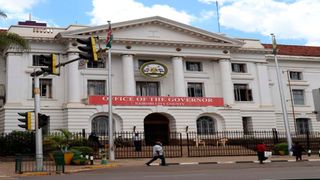
The City Hall building in Nairobi as pictured on April 19, 2021.
| File | Nation Media GroupNairobi
Premium
Pain for Nairobi residents as City Hall mulls tax rise
What you need to know:
- Top among the newly imposed levies will be a new Sh200 fee charged to open a file at Pumwani Maternity Hospital.
- Traders have also been hit hard and will now have to pay offloading fees with the fees ranging between Sh30 and Sh3,000.
The cost of living in Nairobi is set to rise from next month if a raft of new levies proposed by City Hall is approved by the assembly.
The Nairobi City County government, in its Financial Bill 2021, has introduced new levies and increased charges for different services to raise money to finance its Sh38.8 billion budget. Top among the newly imposed levies will be a new Sh200 fee charged to open a file at Pumwani Maternity Hospital.
Residents will have to part with Sh200 for consultation per visit, Sh600 for Norplant contraceptive, Sh100 for oral contraception pills and injection, while inserting an intrauterine contraceptive device will cost Sh200, its removal Sh800, and anti-D injection Sh5,500.
For those planning to set up temporary site toilets, bathrooms and changing rooms, they will have to part with between Sh10,000 and Sh50,000 depending on size, while to get authority for temporary occupation at construction sites will cost Sh50,000 per certificate.
Setting up treatment plants in factories, slaughterhouses, estates, and commercial buildings will now come with Sh100,000 per certificate payment while for biodigester, septic tanks, conservancy and toilet permits, the cost will be between Sh10,000 and Sh50,000 depending on size.
Traders have also been hit hard and will now have to pay offloading fees with the fees ranging between Sh30 and Sh3,000.
Offloading a lorry of flowers will cost Sh3,000, a ton of macadamia and French beans will be Sh1,000; while for avocado, the charges will be Sh800 per Probox and Sh1,500 per pickup.
For tomatoes, it will be Sh200 per large box weighing above 100 kilogrammes, Sh100 for medium box weighing above 50kgs and Sh50 for small box weighing 50kgs and less. For imported fish, the charges will be Sh30 per box, thorn melon Sh50 per box, miraa Sh500 for box weighing above 100 kilogrammes and Sh1,000 for those above 500 kilogrammes and Sh100 per 100 kilogrammes bag.
All other items not captured in the list will attract an offloading fee of Sh100 per pickup and Sh500 per lorry.
Budget and Appropriations Committee chairperson Robert Mbatia said the new levies will be considered by the assembly tomorrow.
“The new levies will take effect immediately Governor Ann Kananu assents to the bill after its approval by the assembly or after 14 days of the publication of the bill in the Kenya Gazette, whichever comes first,” said Mr Mbatia.
Further, mobile food vendors and hawkers will part with Sh7,000 for food hygiene licence per premise, same for small food or water packaging certificate.
For medium food or water packaging, the charge will be Sh15,000, rising to Sh20,000 for large food or water packaging.
For short one-day trainings by food handlers, Sh500 will be paid per course while food laboratory tests will cost a trader between Sh500 and 3,500 depending on the test. Operating a kitchen at the newly-built Karandini Market will cost a trader Sh60 per square feet on the ground floor and Sh54 per square feet on the first floor.
For open food courts, the charges will be Sh30 per square feet for a court yard, Sh45 for one on ground floor and Sh40 on first floor.
In terms of stalls, the charges will be Sh60 on the ground floor, Sh54 on the first floor.
For Westlands Market, eateries and nyama choma joint operators will part with Sh70 per square feet on ground floor, Sh58 on first floor, Sh45 on second floor and Sh36 on third floor.
Operating roller shutter door stalls, butcheries and salons will cost a trader Sh100 on the ground floor, Sh80 on the first floor, Sh64 on the second floor and Sh50 on the third floor.
“The charges are according to the space area one is allocated and there is a provision to pay quarterly, half yearly or yearly,” said Mr Mbatia.





